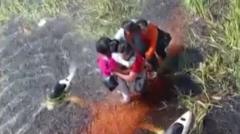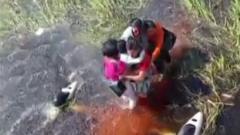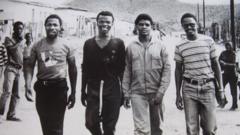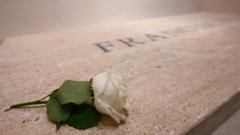On the 80th anniversary of Auschwitz's liberation, around 50 survivors, alongside dignitaries such as King Charles and Emmanuel Macron, gather to honor the memory of the victims. Notable survivor Jona Laks urges the world to acknowledge the past while the observance faces shifting political landscapes and reflects on the haunting legacy of the Holocaust.
Commemoration of Auschwitz Liberation: Survivors Share Harrowing Stories 80 Years Later
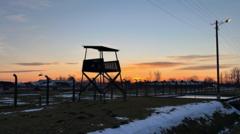
Commemoration of Auschwitz Liberation: Survivors Share Harrowing Stories 80 Years Later
As Auschwitz-Birkenau marks 80 years since its liberation, a somber event highlights the voices of surviving witnesses, who emphasize the importance of remembering history to prevent future atrocities.
The 80th anniversary of the liberation of Auschwitz-Birkenau serves as a poignant reminder as approximately 50 survivors gather at the site to honor the memory of those lost in one of history's darkest chapters. Among them, Jona Laks, now 94, who endured the horrors of this Nazi death camp, emphasizes the necessity of sharing their stories to ensure history does not repeat itself.
The commemoration on January 27, 1945, will be attended by dignitaries including King Charles III, French President Emmanuel Macron, and German President Frank-Walter Steinmeier. However, the spotlight will remain on the survivors whose testimony is vital in conveying the sheer enormity of loss—approximately 1.1 million victims, predominantly Jews—while also underscoring the universal right to life. "Every soul on this earth has the right to live," Laks stated, remembering her harrowing experiences during the Holocaust.
Due to the cold January temperatures, organizers have set up a heated tent over the infamous "Death Gate" at Birkenau to accommodate the aging survivors during the ceremonies. The day will commence with a wreath-laying ceremony led by President Andrzej Duda alongside the survivors, paying tribute at the "Death Wall" in Auschwitz I, where thousands met their end.
In reflecting on the past, historian Susanne Willems expresses the deep connections formed with survivors throughout her years of research. Each living account becomes a personal narrative intertwined with the broader historical context of the Holocaust. Recent trends of rising far-right populism in Europe, particularly in countries like Germany, have reignited discussions about the importance of preserving the memory of Auschwitz and the horrors associated with it. As noted, there will be no political speeches during this solemn occasion, with the absence of a Russian presence particularly significant given current geopolitical tensions.
Laks's own story is a harrowing testament to the brutal choices faced by inmates at Birkenau, and her survival, alongside her twin sister, was a matter of sheer chance. The experiences of families torn apart by Nazi ideology underline the enduring impact of these events on subsequent generations. Auschwitz stands not only as a memorial site but as a stark reminder of humanity's capacity for cruelty.
The attendance of contemporary figures like Liliana Segre, a prominent Auschwitz survivor who is participating in parallel observances in Italy, highlights the ongoing struggle against hatred and anti-Semitism, emphasizing that the lessons of Auschwitz must never be forgotten. For many, this stark juxtaposition of historical memory and current realities for survivors remains pressing, as calls to remember the past resonate louder in the face of contemporary intolerance.
As thousands of visitors continue to flock to the site—1.83 million in the previous year alone—it is crucial for all narratives surrounding the Holocaust to be preserved, ensuring that the horrors of Auschwitz never fade from collective memory.






